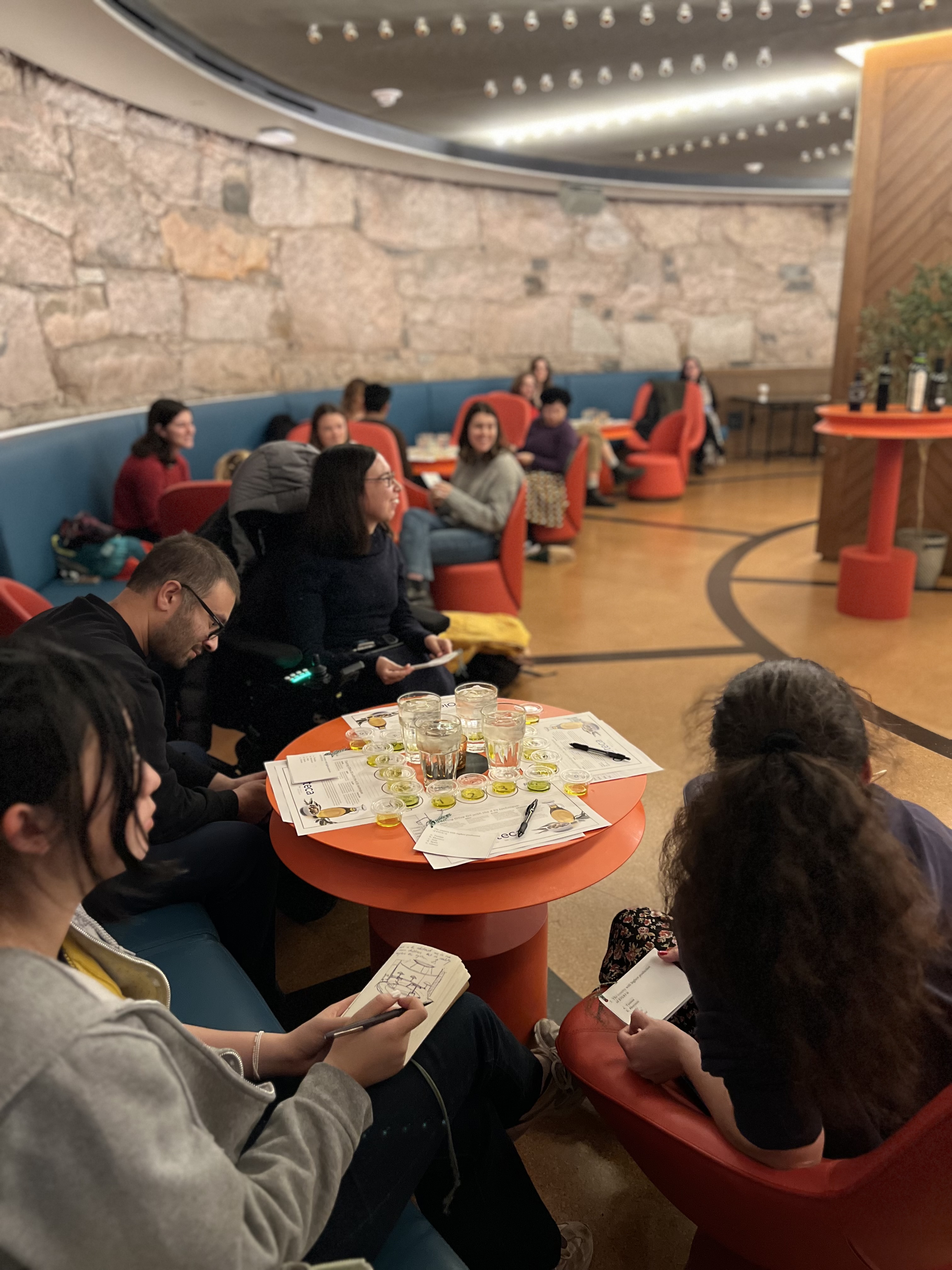Here at Yale, where knowledge takes many unexpected forms, an intriguing alliance emerges. Hosted in The Well at Yale Schwarzman Center by the Yale School of Public Health and Yale Hospitality, Oleoteca delves deep into the enigmatic world of extra virgin olive oil. But this isn’t just another tasting event (yes, olive oil tasting is a thing), it is a revelatory expedition led by Tassos Kyriakides a professor of Biostatistics with a profound affinity for Mediterranean culture and nutrition. Through this exploration, Kyriakides illuminates a story of health, sustainability, and cultural interconnectedness.
The Unassuming Olive

Photo: Tola Gbadamosi
Yale University surpasses the norm with an annual olive oil consumption exceeding 6 liters per person, a stark contrast to the US average of approximately 1 liter per person per year.
Kyriakides, a connoisseur, and advocate of Greek and Mediterranean culinary heritage recently earned his stripes as an olive oil sommelier from the International Culinary Center and the Olive Oil Education Lab in New York. His intent in creating Oleoteca was bridge-building, seeking to unify disparate realms of health studies and general community at Yale through shared gustatory experiences. Upon returning from a year-long series of panels on food and culture a few years ago, engaging a myriad of cultural perspectives at the crossroads of food research, culinary expertise, and public health practice, Kyriakides thought, we have to build something focused on nutrition research and dissemination of oil. “So, we started throwing around ideas and came up with this concept,” he said.
One way Kyriakides' vision manifested was in this olive oil tasting center, a unique invention in the higher education circuit. Yale University surpasses the norm with an annual olive oil consumption exceeding 6 liters per person per year, a stark contrast to the U.S. average of approximately 1 liter per person per year. Kyriakides highlights Yale's Oleoteca—the first and only U.S. university-sponsored and based olive oil tasting experiential initiative, to his knowledge—offering an immersive understanding and appreciation of Extra Virgin Olive Oil. Activities like the Oleoteca, are part of an effort to establish an entity on campus that will focus, through research, education, and community engagement, on the olive tree, its products, and their impact on human and planetary health. This idea was first introduced in 2018 and has been followed by several international symposia, activities, and events.
Reflecting on the significance of the Schwarzman Center and the Oleoteca event as mechanisms for dissemination of public health information, he remarks “I want [Oleoteca] to be an experience . . . there’s something about enjoying food and company that anything you hear you’re more likely to retain and remember it later.”
I want [Oleoteca] to be an experience . . . there’s something about enjoying food and company that anything you hear you’re more likely to retain and remember it later.
Jackson Higginbottom MPH ‘20 a behavior change researcher commented, “I'm excited to see how the olive oil tastings are broadening the scope of public health practice and education beyond the School of Public Health to more central areas of Yale’s campus. This initiative is an innovative way to introduce students to the health benefits of olive oil, making the subject approachable and engaging. It's a wonderful example of how public health topics can be woven into everyday campus life, creating a more health-conscious community.”
And an experience it was. More than a mere sampling, Oleoteca took attendees on a voyage through the complexities of olive oil—the nuances of its fragility against heat, age, light, and oxygen; the unassuming heroes, polyphenols, safeguarding its health benefits; and the intricate alchemy of its creation. Participants learned that olive oil is a delicate tapestry of flavors and science, hidden beneath a perceived guise of simplicity. “I knew olive oil making was an art, but not that it was so subtle and precise!” shared Josefine, a Philosophy PhD student, echoing everyone’s newfound appreciation.
As the symposium reached its finale, it wasn't just a discourse on olive oil, it was an unveiling. The unpretentious olive, often overlooked, emerged as a poignant emblem—a humble bridge between general community and a shared responsibility toward a healthier world. “I’ve never been to an olive tasting event. It completely changed my perception about how to taste, store and have olive oil,” commented Yury, a postdoctoral scientist. Reflecting on the health benefits of his new discovery, he added, “After this event, I am planning to have a shot of green olive oil every morning!”
Oleoteca stands as a testament to the dedication of incorporating healthy practices into daily living. In this way Yale Hospitality – in partnership with Yale School of Public Health and the Schwarzman Center - has become a conduit to the unraveling of timeless wisdom cocooned within the unassuming olive.
Higginbottom concluded, “Yale Hospitality's decision to systematically incorporate olive oil into campus dining is a meaningful move towards healthier defaults. This initiative not only exemplifies how a strategic shift at an organizational level can facilitate healthier choices for individuals, but also illustrates the potential for such changes to create a ripple effect of positive health outcomes across the entire Yale community. By proactively altering the food environment, Yale Hospitality is setting a powerful example of how institutions can lead in fostering sustainable health behaviors on a large scale.”
By proactively altering the food environment, Yale Hospitality is setting a powerful example of how institutions can lead in fostering sustainable health behaviors on a large scale.
Article last updated on April 10, 2024




